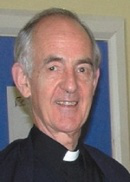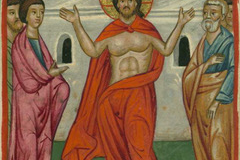Homily: Bishop George Stack at funeral of Canon Patrick Davies

Canon Pat Davies RIP
Bishop Stack gave the following homily at Westminster Cathedral today.
To listen to the homily click here: www.rcdow.org.uk/multimedia/?page=audio&player=100
Last Thursday, the Bishop of Rome spoke to the priests of his Diocese about the nature, purpose and significance of the priesthood. Of the many beautiful and challenging things he said, these words put me in mind of Canon Pat Davies:
"The Son of God became man precisely to be a priest (to offer God perfect worship) to create in himself a "communion" between God and man". He went on to describe that the mission of the ordained priest "is to be a mediator, a bridge that unites, thus bringing man to God and bringing true life".
Is there any better word to describe Patrick than the word "bridge"? His network of relationships spreading from Douay to University, to the hockey team and to his professional colleagues both in oil and in accountancy. And then his second circle of solidarity with the poor and dispossessed, those who were unjustly treated for any reason whatsoever. From Lima to Calcutta, from South Africa and beyond. All contributed to forming Patrick the priest.
No wonder he chose those words from the prophet Isaiah for his funeral Mass. They were an inspiration for his work for Justice and Peace and for the Bishops' Conference as well as CAFOD, PROGRESSIO and so many other agencies:
He will teach us his ways,
So that we may walk in his paths.
They will beat their swords into ploughshares
And their spears into pruning hooks (Is 2:3)
His personal integrity and his passion for what is right were perhaps belied by his gentle and respectful approach to people in the parishes he served. He was a man of the Diocese through and through, and was delighted to have been appointed a Canon of the Chapter of Westminster Cathedral. As Treasurer of the Chapter and parish priest, administration came easily to him. But his capacity to see beyond the surface into the heart of issues and the courage and strength he showed in the passion and compassion of the many causes he worked for, explain his choice of the extract from the letter of Paul to his somewhat nervous young disciple, Timothy:
For this reason I remind you to fan into a flame the gift of God which is in you through the laying on of my hands. For God did not give us a spirit of timidity but a spirit of power, of love and of self discipline (2 Tim 1:6-7)
This was summed up by him in another way when a priest friend drew attention to Patrick's initials P.W.H.D. He interpreted them as Pray, Work, Hope and Dream. Not a bad motto for any of us!
His period of extended illness brought out another dimension of Patrick's life and faith. The onset of Parkinson's, and then Lymphoma, must have brought the "if only" questions to his lips as they did to those of Martha - and to all of us as we try to understand the place of suffering in life.
"Lord, if only you had been here, my brother would not have died".
If only Patrick's fruitful ministry had not been curtailed by a debilitating illness. If only he could have carried on his work in the field of Justice and Peace. If only he hadn't suffered from that cancer which demanded such radical surgery towards the end of his life.
Yet as so often in these situations, new depths are reached in the life of a person, deeper faith is expressed, a greater tranquillity and dependence on the love of God when all else falls away becomes the mark of greatness.
In this Cathedral, last Sunday, the Archbishop spoke of the sign of the Cross which he made on Patrick's forehead as they prayed for a happy death. He spoke of the significance of the Cross in casting light on the truth that is no suffering is wasted in the sight of God. Although we might describe sickness as a "waste of time", as a contradiction of everything we strive to achieve in life, as Christians we believe that no time is wasted in which God is served. The service of God is the sanctification of time. And when time weighs heavily on our hands, when our immobility means that we can do little or nothing for ourselves, God nervously, tentatively, hopefully invites us to trust in Him. Gradually He reveals to us that the Cross, which is the lowest point of human history, becomes the highest point of God's revelation. On the Cross, Jesus, the innocent Jesus confronts suffering, sin, death. He engages with all those things that cause us to question the presence of God, perhaps even the goodness of God, in allowing these things to happen. On the Cross, Jesus does not withdraw God's love. He does not say they do not deserve what I have done for them. They are unforgivable. On the Cross, Jesus goes on revealing, goes on loving, goes on forgiving. In doing so, he gives us a glimpse beyond every circumstance of life - and death. Hence his words to Martha: "He who believes in me will live, and whoever believes in me will never die. Do you believe this?"
Patrick believed this truth. He lived his life by it. And in the manner of his death he proclaimed it in a living sermon which went far beyond human words. May his gentle and passionate soul rest in peace.
Source: Archbishops House


















